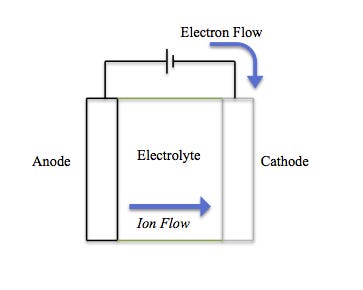Bio Batteries
Profile: An energy storage device that is powered by organic compounds, such as enzymes or microorganisms. It’s these that catalyze chemical reactions.
Anode: Enzymes, Microorganisms, Carbon-Based Materials, Conductive Polymers
Cathode: Typically facilitates the reduction reaction: oxygen, electron acceptors, carbon-based materials (graphite), or noble metals.
Electrolyte: Aqueous electrolytes, ionic liquids, biological fluids, solid-state electrolytes.
Charging Speed: Depends on the materials used but generally, they have slower charging rates due to the biological processes involved in generating electricity. Often, these cells are limited by the rate at which microorganisms can oxidize organic compounds and transfer electrons.
Performance: Power output is typically lower density due to design and materials used. As a result, they generate less electrical power per unit volume. They still provide sufficient power for some uses, such as environmental sensors or medical devices.
Scarce Resources Used?: Graphene

Where To Access These Scarce Resources:
Graphite Exports (2021) (China - 47.82%, United States - 8.69%, Madagascar - 7.11%)
Graphite Production (2018) (China - 630,000Mt, Brazil - 95,000Mt, Canada - 40,000Mt)
Graphite Annual Usage (2021) - 3,500,000 Tonnes
Energy Storage Capabilities: Lower storage capabilities versus conventional batteries.
Positive Features: Renewable and sustainable, low environmental damage, versatile
Negative Features: Limited energy density, slow charging and discharging, complexity, limited scalability, and durability.
Chances of Scalability: Maintaining conditions for microbial growth and activity can be challenging and costly on a larger scale. Scaling up individual batteries can limit transfers, affecting overall battery performance. Coordinating the interactions between the components in a bio battery comes down to biological processes. This can be more technically challenging to maintain suitable conditions.

Recent Research On Bio Batteries:


